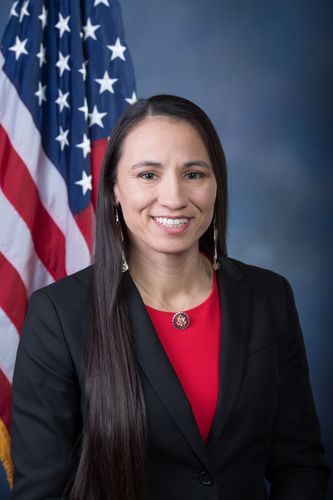Davids, Johnson launch Congressional Sustainable Aviation Caucus

Rep. Sharice Davids, D-Kan.
June 10, 2024
BY Erin Voegele
Reps. Sharice Davids, D-Kan., and Dusty Johnson, R-S.D., on June 10 announced the launch of the Congressional Sustainable Aviation Caucus. The CSAC will help lawmakers remain informed about initiatives to improve the sustainability of aviation, including the development and use of sustainable aviation fuel (SAF).
The caucus, co-chaired by Davids and Johnson, will work to reduce the aviation industry’s environmental impact and maximize its financial sustainability. The CSAC aims to play a key role in the integration of new technologies into the nation’s aviation network by accessing federal policy, holding forums and bringing together public and private partners.
Advertisement
Advertisement
Numerous initiatives are underway to advance sustainability goals through the adoption of SAF and the integration of technologies that improve aircraft fuel efficiency, reduce emissions, and save money in the long run. The CSAC will provide a forum to stay informed about these initiatives and to assess the policies, processes, and resources needed to further environmental gains, enhance fuel supply resiliency, and strengthen national security.
In addition to sending periodic information updates, the CSAC will hold frequent briefings for member offices focused on current efforts to form an environmentally and economically sustainable aviation future; new developments in the sustainable aviation space, including energy, aerospace, technology and model shifts; implementation of existing technologies into domestic and international aviation; and future challenges and opportunities that await sustainable aviation, such as fuel production, workforce and regulatory structures.
I am proud to announce the formation of the Congressional Sustainable Aviation Caucus, which will bring together a wide variety of aviation leaders and policymakers to help reduce the aviation industry’s impact on the environment and ensure its long-term economic viability,” Davids said. “Adopting these sustainable practices is critical for our national security and economic resilience. I’m glad to join forces with Representative Johnson to ensure America’s aviation industry continues to be resilient and reliable for years to come.”
Advertisement
Advertisement
“The aviation industry is flying towards a more sustainable future. From sustainable aviation fuel to Advanced Air Mobility to hydrogen aviation, there are a lot of shifts we can expect to see in the coming years,” Johnson said. “Congress should advance legislative priorities that support innovation through biofuels, national security, and passenger safety. I look forward to working with Rep. Davids on this caucus.”
Additional information on the CSAC is available on Davids’ website.
Related Stories
The U.S. Energy Information Administration maintained its forecast for 2025 and 2026 biodiesel, renewable diesel and sustainable aviation fuel (SAF) production in its latest Short-Term Energy Outlook, released July 8.
XCF Global Inc. on July 10 shared its strategic plan to invest close to $1 billion in developing a network of SAF production facilities, expanding its U.S. footprint, and advancing its international growth strategy.
U.S. fuel ethanol capacity fell slightly in April, while biodiesel and renewable diesel capacity held steady, according to data released by the U.S. EIA on June 30. Feedstock consumption was down when compared to the previous month.
XCF Global Inc. on July 8 provided a production update on its flagship New Rise Reno facility, underscoring that the plant has successfully produced SAF, renewable diesel, and renewable naphtha during its initial ramp-up.
The U.S. EPA on July 8 hosted virtual public hearing to gather input on the agency’s recently released proposed rule to set 2026 and 2027 RFS RVOs. Members of the biofuel industry were among those to offer testimony during the event.
Upcoming Events










